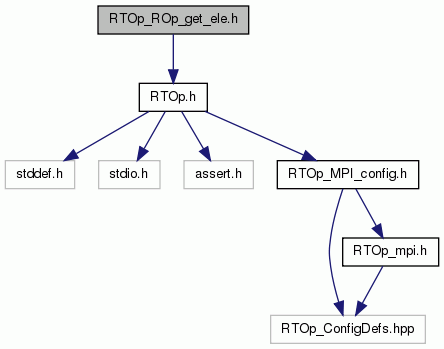|
MOOCHO (Single Doxygen Collection)
Version of the Day
|
|
MOOCHO (Single Doxygen Collection)
Version of the Day
|
#include "RTOp.h"

Go to the source code of this file.
| const struct RTOp_RTOp_vtbl_t | RTOp_ROp_get_ele_vtbl |
| int | RTOp_ROp_get_ele_construct (RTOp_index_type i, struct RTOp_RTOp *op) |
| int | RTOp_ROp_get_ele_set_i (RTOp_index_type i, struct RTOp_RTOp *op) |
| int | RTOp_ROp_get_ele_destroy (struct RTOp_RTOp *op) |
| RTOp_value_type | RTOp_ROp_get_ele_val (RTOp_ReductTarget targ_obj) |
Reduction operator for looking up the value of an element.
targ_obj <- v[0](i)
This operator is only defined to allow one vector argument (num_vecs == 1) v[0] but it can handle sparse and dense vectors. Using a reduction operator to lookup and an element will be reasonably efficient for some types of vector subclasses (i.e. dense and sparse serial and parallel vectors) but very slow for others (i.e. out-of-core vectors). It would be better for vector subclasses to implement this operation directly but if they don't you can use this operation to lookup an element. Of course the user should not abuse this operation in order to access a bunch of elements in a vector. To do so would be very inefficient. This is what reduction operators where designed to avoid.
Definition in file RTOp_ROp_get_ele.h.
| int RTOp_ROp_get_ele_construct | ( | RTOp_index_type | i, |
| struct RTOp_RTOp * | op | ||
| ) |
Definition at line 112 of file RTOp_ROp_get_ele.c.
| int RTOp_ROp_get_ele_set_i | ( | RTOp_index_type | i, |
| struct RTOp_RTOp * | op | ||
| ) |
Definition at line 120 of file RTOp_ROp_get_ele.c.
| int RTOp_ROp_get_ele_destroy | ( | struct RTOp_RTOp * | op | ) |
Definition at line 126 of file RTOp_ROp_get_ele.c.
| RTOp_value_type RTOp_ROp_get_ele_val | ( | RTOp_ReductTarget | targ_obj | ) |
Definition at line 133 of file RTOp_ROp_get_ele.c.
| const struct RTOp_RTOp_vtbl_t RTOp_ROp_get_ele_vtbl |
Definition at line 99 of file RTOp_ROp_get_ele.c.
 1.8.6
1.8.6